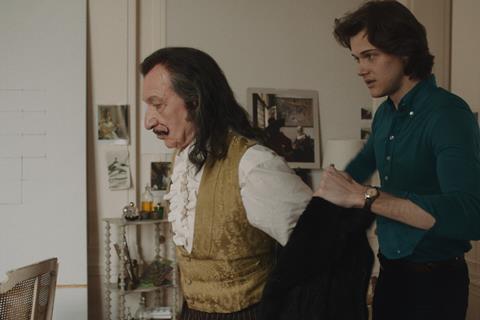Ben Kingsley and Barbara Sukowa play the Catalan artist and his tempestuous wife in Mary Harron’s Toronto closer

Dir: Mary Harron. UK/US. 2022. 104mins.
A film which warns about the dangers of meeting your heroes, Daliland thrusts an enthusiastic but naive young art admirer into the orbit of Salvador Dali, the Catalan artist whose all-consuming relationship with his Russian wife Gala is both stormy and surreal. Director Mary Harron’s latest film could be seen as a companion piece to her superb 1996 drama I Shot Andy Warhol, which also took a dim view of the art scene, focusing on its fragile egos and fickle faddishness. Unfortunately, Daliland isn’t nearly as penetrating, allowing Ben Kingsley and Barbara Sukowa to go big as the tempestuous couple without really suggesting much of these characters’ inner lives. Closing out the Toronto Film Festival, this fictional account could lure Dali acolytes, but reviews may not be entirely rapturous. Commerical prospects may be stilted due to the presence of the controversial Ezra Miller in the role of Dali during his younger years.
Because ’Daliland’’s protagonist is such a cipher, the film struggles to get us invested in his growing disillusionment at being around the needy, ageing Dali.
The film is set in 1973/4, by which time the septugeniaran Dali would occasionally take up residence at the St Regis hotel in New York. James (newcomer Christopher Briney), recently hired at a local gallery that works with the revered, eccentric artist, is soon recruited by Dali to be his personal assistant. Dali is intrigued by James, who left art school because he was more interested in supporting other artists than being one himself, but warns him to be wary of his libidinous wife Gala (Sukowa), who enjoys her dalliances.
As its title suggests, Daliland wants to sweep us (and James) up in Dali’s bizarre vortex — his is an existence filled with wild parties and unorthodox creative sessions. (Impulsively, Dali one day instructs his assistant to summon gorgeous women with shapely bottoms to his studio so he can dip their derrieres in paint.) Cocaine and threesomes are the norm, and the sheltered, small-town James is instantly hooked — especially after he falls in love with society girl Ginesta (Suki Waterhouse), although he’ll quickly realise that meaningful emotional attachments are fleeting in such a crazed environment.
As is often the problem with films in which the everyday main character is our surrogate into the world of a famous individual, John C. Walsh’s script fails to render James as a compelling figure in his own right. Briney possesses the raw beauty that would make him alluring to Dali and Gala — who initially has designs on him — but the actor can’t convey James’ spiritual desolation or the sense that he’s desperately seeking a fulfilment he may never find. And because Daliland’s protagonist is such a cipher, the film struggles to get us invested in his growing disillusionment at being around the needy, ageing Dali.
Kingsley sinks his teeth into his character’s accent and flamboyant manner — Dali’s trademark moustache is fittingly over-the-top as well — but it’s an impression rather than an interpretation, leaving us with one more cinematic portrait of a great artist who wasn’t necessarily a splendid human being. (It doesn’t help that Dali’s peculiarities — like his desire to masturbate clandestinely while watching others having sex — come across as bizarre quirks rather than something worth exploring.) Especially when Kingsley and Sukowa tear into one another — Dali’s growing jealousy regarding Gala’s infatuation with other men becomes volcanic — Daliland dials up the actorly pyrotechnics, but it’s all spectacle without insight, failing to lay a foundation for why this long-running marriage, despite its volatility, endured.
The film introduces occasional flashbacks as Dali looks backs at his courtship of Gala. These short glimpses into the past are meant to suggest the innocence and spark of new love, but they’re hamstrung by Miller’s cartoonish portrayal of the younger Dali. If Kingsley can similarly be accused of overdoing Dali’s signature vocal tics, at least the older actor exudes the hammy gravitas appropriate for Dali, who later in life was viewed as a past-his-prime genius on the verge of becoming a self-parody.
On occasion, Harron taps into the absurdity of Dali’s universe, mocking the talentless hangers-on and scorning those who try to profit off the icon’s reputation. She structures the film like a bittersweet tragedy about a painter who has lost his way and the young man who adores his work but discovers some difficult truths about personal integrity and the unpredictability of the creative life. But because Harron never quite locates the humanity in her characters, whether they be famous or not, Daliland lacks the provocation and brilliance that defined Dali’s masterpieces. There’s no substance within the surrealism.
Production companies: David O. Sacks Productions, Edward R. Pressman Productions, Chris Curling Productions
International sales: Bankside Films, yana@bankside-films.com
Producers: Edward R. Pressman, David O. Sacks, Daniel Brunt, Chris Curling, Sam Pressman
Screenplay: John C. Walsh
Cinematography: Marcel Zyskind
Production design: Isona Rigau Heras
Editing: Alex Mackie
Music: Edmund Butt
Main cast: Ben Kingsley, Barbara Sukowa, Christopher Briney, Rupert Graves, Alexander Beyer, Andreja Pejic, Mark McKenna, Zachary Nachbar-Seckel, Avital Lvova, Suki Waterhouse, Ezra Miller















![[L-R]: Amanda Villavieja, Laia Casanovas, Yasmina Praderas](https://d1nslcd7m2225b.cloudfront.net/Pictures/274x183/6/4/1/1471641_pxl_20251224_103354743_618426_crop.jpg)








